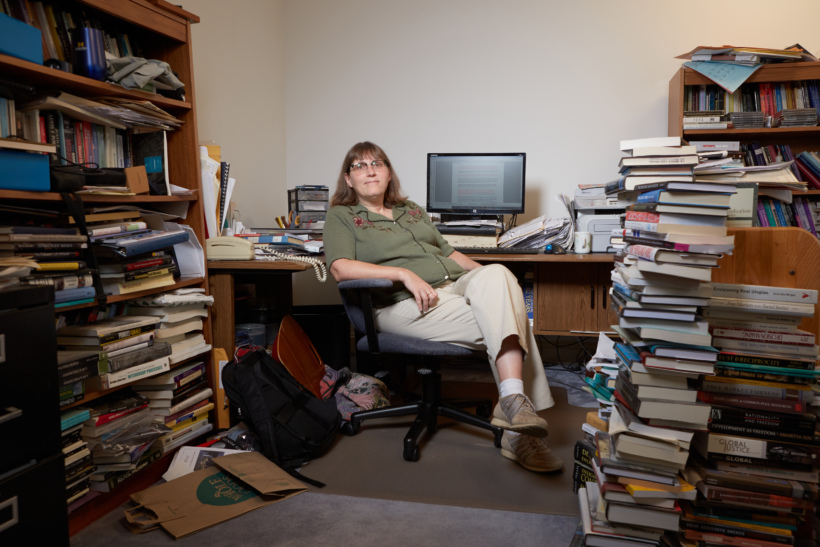News
From the Newsletter: Elizabeth Anderson CN ’86
“I’ve Always Been Omnicurious”: Newcombe Fellow Elizabeth Anderson on Public Discourse, Freedom, and Work

Dr. Elizabeth Anderson CN ’86 (Photo courtesy the MacArthur Foundation)
In a seemingly prescient exchange before the COVID-19 pandemic, a University of Cambridge interviewer asked Elizabeth Anderson CN ’86 about the contemporary role of experts. Her reply: “Experts can no longer rely on their technical knowledge alone… . They need to find constructive ways to relate to the public, to engage the public with their findings in ways that both earn their trust and empower the public to distinguish between real experts and those who disseminate lies, propaganda, and toxic discourse.”
Dr. Anderson, a 2019 MacArthur Fellow, is John Dewey Distinguished University Professor of Philosophy and Women’s Studies and Arthur F. Thurnau Professor at the University of Michigan. With an overall focus on democratic theory, her work has addressed a range of issues thrown into sharp relief this spring: workplace rights and equality, egalitarianism, and, most recently, how individual citizens relate to each other and to public information, particularly at a moment of divisiveness.
“We are living in a highly polarized, divided society—by race, gender, immigrant status, sexual orientation, identity, class—with a lot of rancor and hostility,” Dr. Anderson observes. Much of the conflict in contemporary American discourse, she says, is driven by “a kind of panic by many people that they will no longer be dominant.”
Dr. Anderson is quick to point out that this is nothing new in the history of the United States. “Every time the percentage of the population that is foreign-born peaks, we see a panic. Eventually the panic subsides and people realize this wave of immigrants is perfectly American. So I do have some degree of confidence that this, too, will pass and we’ll return to form.”
Dr. Anderson’s own work has its roots in an early determination to explore contradictory points of view. “As a teenager I grew up in a libertarian, free-market household. The cold war was raging,” she recalls. “Conflict between capitalism and communism was central.” Then, when she got to college, she was taken with an essential tenet of liberal arts education: “Not only should one range widely, but one should go out of one’s way to confront ideas that are orthogonal to one’s own, or at least different.”
For her, that meant discovering—through coursework and through experience in a summer job—that there was “a huge blind spot in the way we talk about markets. It got me thinking that a lot of our political discourse about free markets omits any consideration of what work is like for workers and how they suffer.” This concern has been threaded through Dr. Anderson’s thinking throughout her career. The latest of her more than 80 articles and three major books is Private Government: How Employers Rule Our Lives (and Why We Don’t Talk About It) (2017).
Equally significant in her work has been an ongoing concern with what individual freedom and equity truly mean: not ensuring that everyone has the same material status, but rather ensuring that everyone has the same relational status, the same access to rights and respect. In a January 2019 New Yorker profile, “The Philosopher Defining Equality,” a journalist at one of Dr. Anderson’s lectures captures her observation on the roots of individual liberty in the evolution of religious tolerance: “‘The ability not to have an identity that one carries from sphere to sphere but, rather, to be able to slip in and adopt whatever values and norms are appropriate while retaining one’s identities in other domains… . That is what it is to be free.’”
Dr. Anderson, who remembers her Newcombe Fellowship as the incentive she needed to get her dissertation finished at Harvard, says one of her proudest accomplishments is having created and directed the University of Michigan’s Program in Philosophy, Politics, and Economics. “I’ve always been omnicurious,” she says. “I think that insights from every single discipline are needed in order to manage and solve the problems that human beings face. I also take a relational perspective on moral and political problems—I have a central focus on the quality of human relationships and whether they are respectful and functional and mutually supporting.”
###
This story appeared in the spring 2020 digital issue of Fellowship, the newsletter of the Woodrow Wilson Foundation. Part of this issue explored the Foundation’s 75 year history of facing challenges and building fields. Help sustain this mission with a gift to WW.


